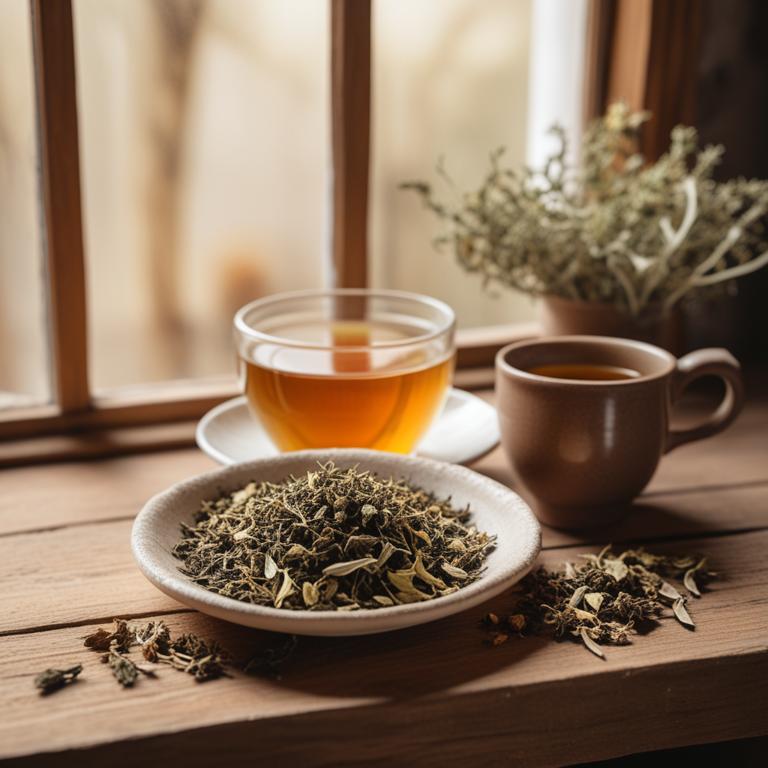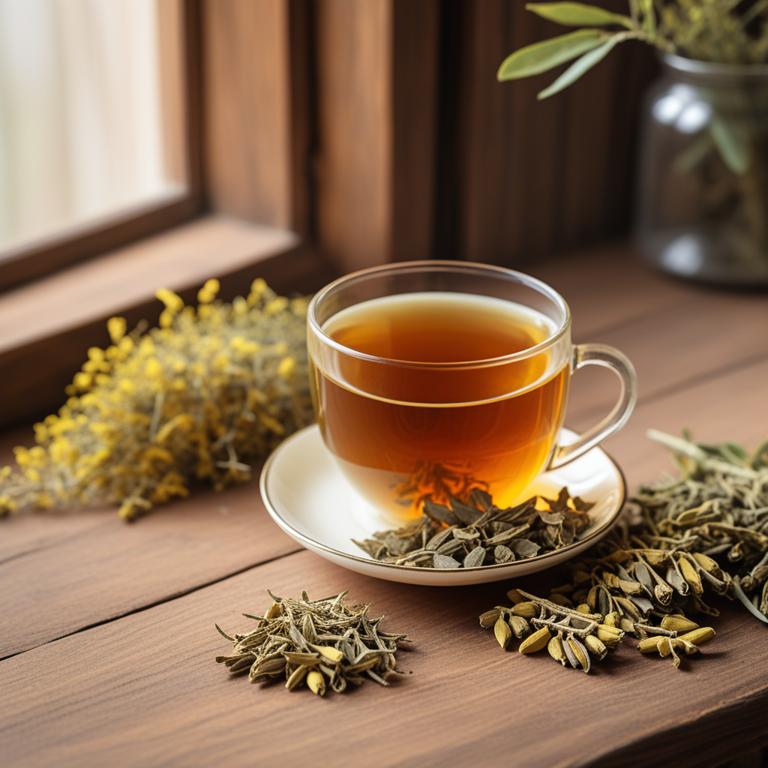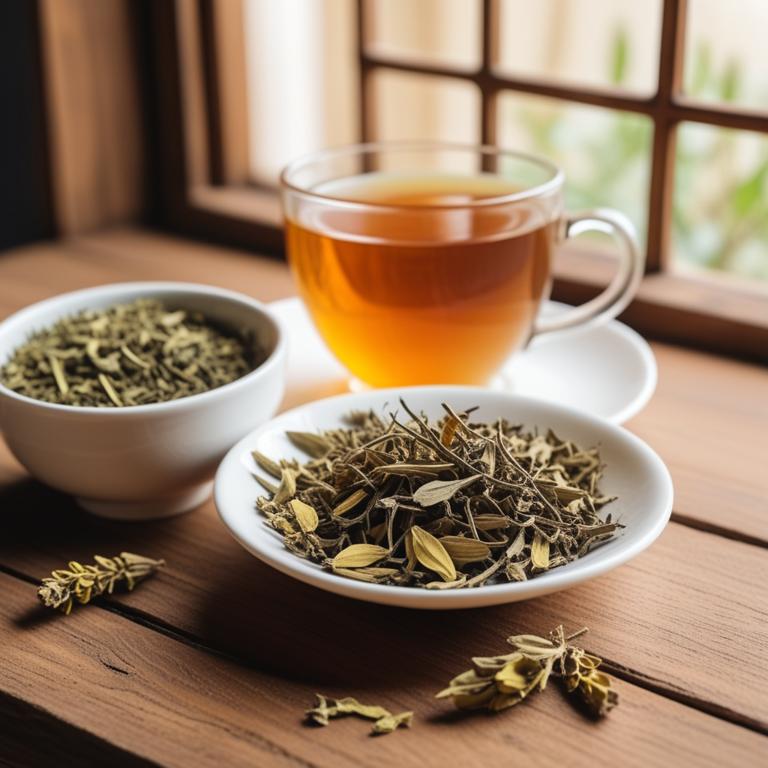7 Herbal Teas For Constipation

Herbal teas can be a great help when it comes to relieving constipation.
Some herbs, like Zingiber officinale or ginger, work by increasing the movement of food through the digestive system. This helps to soften stool and make it easier to pass. Glycyrrhiza glabra, or licorice root, also helps to reduce inflammation in the digestive tract, which can contribute to constipation. Curcuma longa, or turmeric, has anti-inflammatory properties that can also help to soothe the digestive system. Drinking herbal teas for constipation can bring a range of benefits to your life.
For one, it can help to prevent uncomfortable symptoms like bloating and cramping. It can also help to keep you regular, which can boost your energy levels and make it easier to stick to a healthy diet. Some herbal teas may even help to reduce stress and anxiety, which can contribute to digestive issues. When you drink herbal teas, the herbs are absorbed into your bloodstream and start working on your digestive system. This can lead to softer stool, easier bowel movements, and a reduced risk of constipation.
As a result, you may feel more comfortable, have more energy, and be able to enjoy your daily activities without the discomfort of constipation.
- 1. Zingiber officinale
- 2. Glycyrrhiza glabra
- 3. Curcuma longa
- 4. Foeniculum vulgare
- 5. Cassia angustifolia
- 6. Cassia auriculata
- 7. Terminalia chebula
1. Zingiber officinale

Zingiber officinale teas contains gingerols and shogaols, which are bioactive constituents that have anti-inflammatory properties.
These compounds help to relax the muscles in the digestive tract, making it easier for food to pass through. The warm, soothing nature of ginger also helps to stimulate digestion and relieve bloating, which can contribute to constipation. Additionally, ginger has a direct effect on the gut, increasing the movement of the muscles that push food through the digestive system.
By increasing gut motility and reducing inflammation, Zingiber officinale teas can help to alleviate constipation and promote a healthy digestive system.
- Gather 1 teaspoon of dried ginger root and 1 cup of boiling water.
- Steep the ginger root in the boiling water for 5-7 minutes.
- Strain the mixture into a cup and discard the ginger root.
- Add 1 tablespoon of honey (optional) to taste, and mix well.
- Drink the tea immediately and repeat as needed, ideally 2-3 times a day.
Zingiber Officinale Tea on Amazon
FGO Organic Ginger Tea, 100 Count, Eco-Conscious Tea Bags, Caffeine Free, Packaging May Vary (Pack of 1)
Disclaimer: We earn a commission if you click this link and make a purchase at no additional cost to you.
2. Glycyrrhiza glabra

Glycyrrhiza glabra teas contains a compound called glycyrrhizin, which has anti-inflammatory properties that help soothe the digestive system.
The tea also contains flavonoids, such as liquiritin and isoliquiritin, that have antioxidant and anti-inflammatory effects, which can help relax the muscles in the intestines and improve bowel movements. Glycyrrhizin has also been shown to increase the production of bile, which helps to break down food and move it through the digestive system. This can help to relieve constipation by promoting regular bowel movements and reducing the symptoms associated with it.
The laxative effect of glycyrrhizin can also help to stimulate the intestines and increase the frequency of bowel movements.
- Gather 1 cup of water and 1 teaspoon of dried Glycyrrhiza glabra root.
- Heat the water in a pot and bring it to a boil.
- Add the dried Glycyrrhiza glabra root to the boiling water and reduce the heat to low.
- Let the mixture simmer for 5-10 minutes, then strain it into a cup.
- Drink the tea 1-2 times a day to help with constipation.
3. Curcuma longa

Curcuma longa teas contains bioactive compounds like curcumin, demethoxycurcumin, and bisdemethoxycurcumin.
These compounds have anti-inflammatory and antioxidant properties that help to relax the muscles in the digestive tract and improve digestion. Curcumin also has a stimulating effect on the digestive enzymes in the gut, which helps to break down food and prevent constipation. The antioxidant properties of curcuma longa teas help to reduce inflammation and oxidative stress in the digestive tract, which can contribute to constipation.
By improving digestion and reducing inflammation, curcuma longa teas can help to alleviate constipation and promote regular bowel movements.
- Gather 1 teaspoon of dried Curcuma longa root powder.
- Boil 1 cup of water in a pot.
- Add 1 teaspoon of honey to the boiling water, if desired.
- Add the Curcuma longa root powder to the water and stir well.
- Let the mixture steep for 5-7 minutes, then strain and drink.
4. Foeniculum vulgare

Foeniculum vulgare teas contains a variety of bioactive constituents, including volatile oils like anethole, limonene, and fenchone, which contribute to its digestive benefits.
The anethole in Foeniculum vulgare teas has a direct effect on the smooth muscle in the digestive system, helping to relax and stimulate bowel movements. This is due to its ability to inhibit the action of acetylcholine, a neurotransmitter that can cause muscle contraction. Foeniculum vulgare teas also contains fiber, which helps to add bulk to stool and promote regular bowel movements.
By promoting relaxation of the muscles in the digestive system and increasing stool bulk, Foeniculum vulgare teas can help to relieve constipation.
- Gather Foeniculum vulgare seeds (aniseed) and a coffee filter.
- Measure 2 tablespoons of Foeniculum vulgare seeds and place them in a cup.
- Pour 1 cup of boiling water over the seeds and let it steep for 5-7 minutes.
- Strain the liquid using the coffee filter into another cup.
- Drink the tea 2-3 times a day to help with constipation.
5. Cassia angustifolia

Cassia angustifolia teas contains sennosides, anthraquinones, and other bioactive compounds that help stimulate bowel movements and relieve constipation.
These anthraquinones, specifically sennosides A and B, act as natural laxatives by increasing the motility of the gut and stimulating the muscles to contract and move food through the digestive system. Sennosides also reduce the amount of water absorbed by the gut, making stool softer and easier to pass. The combination of these compounds helps to regulate bowel movements and restore a regular digestive rhythm, making Cassia angustifolia teas a popular natural remedy for constipation.
Regular consumption of Cassia angustifolia teas can help to soften stool, ease straining during bowel movements, and reduce the risk of constipation-related complications.
- Gather 2 teaspoons of Cassia angustifolia root powder and a cup of boiling water.
- Steep the root powder in the boiling water for 10-15 minutes.
- Strain the liquid into a cup using a tea strainer or a piece of cheesecloth.
- Add 1 tablespoon of honey to the liquid, if desired, to sweeten the tea.
- Drink the tea 1-2 times a day to help relieve constipation.
6. Cassia auriculata

Cassia auriculata teas contains flavonoids, alkaloids, and saponins as its bioactive constituents.
The flavonoids, specifically kaempferol and quercetin, have been found to have a laxative effect by increasing the movement of the intestines. The alkaloids, particularly roemerine and isoremerine, help to stimulate the digestive system and improve bowel motility. Additionally, the saponins in Cassia auriculata teas help to increase the water content in the intestines, making it easier for stool to pass through.
By enhancing bowel movements and improving the texture of stool, Cassia auriculata teas can help alleviate constipation symptoms.
- Get 1 cup of water and boil it.
- Measure 1 tablespoon of Cassia auriculata leaves and add it to the boiling water.
- Reduce heat and let it simmer for 5-7 minutes.
- Strain the liquid and discard the leaves.
- Drink 1 cup of the tea, 2-3 times a day for relief from constipation.
7. Terminalia chebula

Terminalia chebula teas contains a combination of bioactive constituents like chebulinic acid, chebulagic acid, and tannins.
These compounds have laxative properties that help stimulate bowel movements and relieve constipation. The high fiber content in Terminalia chebula tea helps soften and move food through the digestive system more efficiently. The astringent properties of tannins also help reduce inflammation in the gut and promote a healthy gut lining, which can aid in regular bowel movements.
The combination of these properties makes Terminalia chebula tea a potential natural remedy for constipation.
- Gather 1 tablespoon of Terminalia chebula powder and 1 cup of boiling water.
- Add the powder to the boiling water and stir well.
- Let it simmer for 5-7 minutes.
- Strain the mixture into a cup and discard the powder.
- Drink the tea 1-2 times a day, before meals, to help with constipation.